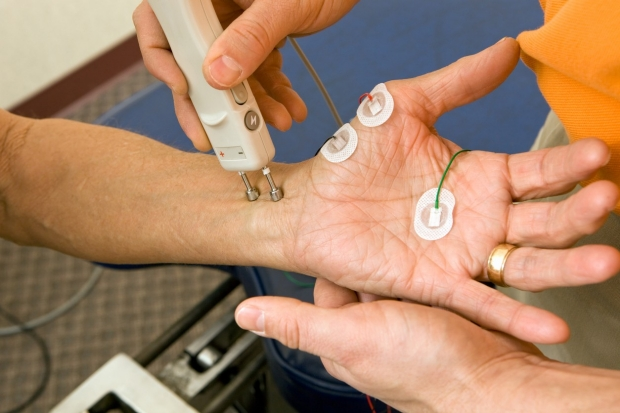In this article, Dr. Gurneet Sawhney one of the Top Neurosurgeons in Thane talks about “All you need to know about Peripheral nerve surgery treatment”
Dr. Gurneet Sawhney Sawhney is a neurosurgeon in India who belongs to the new generation of ultra-modern neurosurgeons. In addition to his remarkable expertise in treating difficult and crucial brain and spinal cord illnesses, Dr. Sawhney has received numerous honors and awards. Dr. Gurneet Sawhney Sawhney is an outstanding and energetic neurosurgeon with significant training in minimally invasive surgery and neurotrauma procedures
Peripheral nerves are responsible for transmitting instructions from your brain and spinal cord to the rest of your body, allowing you to perform tasks such as perceiving the coldness of your feet and moving your muscles to enable you to walk.
Peripheral nerves, which are made up of fibers known as axons that are protected from harm by surrounding tissues, are delicate and readily destroyed.
A nerve injury can impair your brain’s capacity to connect with your muscles and organs, which can be life-threatening. Peripheral neuropathy is a term used to describe nerve damage in the peripheral nervous system.
It is critical to get medical attention as soon as possible after suffering a peripheral nerve injury. Early diagnosis and treatment can help to avoid complications and long-term consequences, says Dr. Gurneet Sawhney, one of the best Neurologists in Thane.
Diagnosis:
Your doctor will go over your medical history with you, inquire about any accidents or past procedures, and then talk with you about your symptoms.
In addition, your doctor will perform a physical and neurological evaluation on you. Your doctor may offer diagnostic testing if your neurological examination reveals evidence of a nerve injury.
These tests could include any of the following:
- Electromyography(EMG): In an EMG, a thin-needle electrode is placed into your muscle and records the electrical activity of your muscle while it is at rest and in motion. Nerve damage might manifest itself as a reduction in muscular activity, notes Gurneet Sawhney, a leading Neurosurgeon in Thane.
- Nerve conduction study: Electrodes put at two distinct locations on your body evaluate the efficiency with which electrical signals flow through your nerves
- Magnetic resonance imaging (MRI): In order to create detailed images of the area affected by nerve injury, an MRI scan is performed using a magnetic field and radio waves.
Treatment:
Thane-based Dr. Gurneet Sawhney opines that If a nerve is wounded but not severed, your injury has a better chance of healing. Injury to the nerve that has been fully severed is extremely difficult to treat, and it is possible that the patient will not be able to recover.
Your doctor will select the best course of action for you based on the severity and source of your injury, as well as the progress of the nerve healing.
It is possible that you will not require surgery if your nerve is mending adequately. It’s possible that you’ll need to rest the affected area until it heals. Nerves recover at a relatively slow rate, and reaching maximum recovery may take several months or years.

You’ll need to see your doctor on a frequent basis to make sure your recovery is on track. If your injury is the result of a medical condition, your doctor will treat the condition that caused the damage.
Aspirin or ibuprofen (Advil, Motrin IB, etc.) may be required to ease the pain associated with your nerve injury, depending on the type and severity of the injury and the extent of the damage.
The usage of medications to treat depression, seizures, and sleeplessness may be beneficial in the treatment of nerve pain. In some circumstances, corticosteroid injections may be necessary to provide pain relief.
Physical therapy may be recommended by your doctor to help avoid stiffness and restore function.
Surgery:
Your surgeon may perform EMG testing in the operating room if your injury does not appear to be healing properly. This will allow him or her to determine whether or not your scarred nerves are recuperating.
When doing an EMG test directly on the nerve, the results are more accurate and trustworthy than when performing the test through the skin.
It is possible for a nerve to be trapped inside a small space (similar to a tunnel) or to be crushed by scarring. In certain instances, your surgeon may choose to widen the restricted space or to release the nerve from the scar tissue.
A segment of a nerve might be entirely severed or damaged beyond repair in some cases. Your surgeon can either remove the damaged section of the nerve and reconnect the healthy nerve endings (nerve repair) or implant a piece of nerve from another place of your body (nerve transplant). These techniques can aid in the regeneration of your nerves.
Your doctor may recommend surgery to restore function to vital muscles if you have suffered a particularly severe nerve injury. This may be accomplished by moving tendons from one muscle to another, says Dr. Gurneet Sawhney, a premium Neurologist in Thane.















